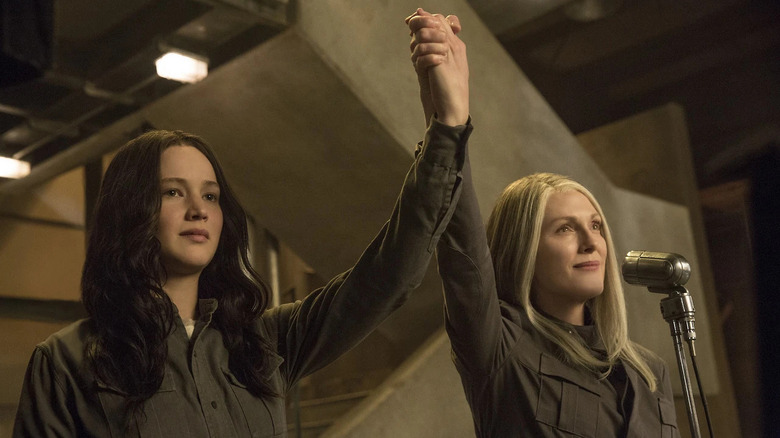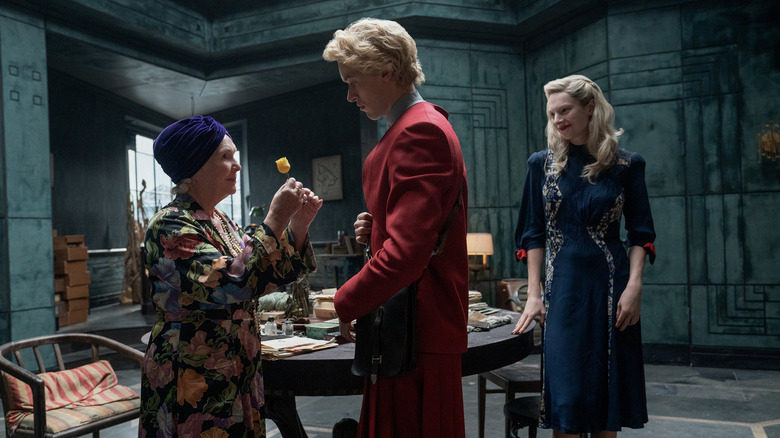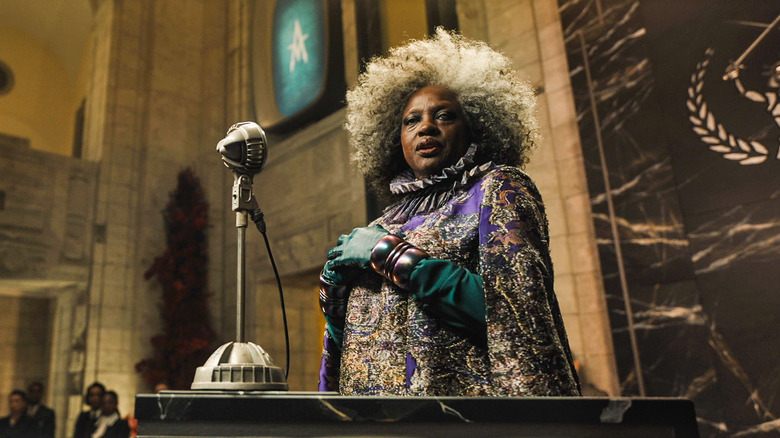Everything The Ballad Of Songbirds And Snakes Doesn't Explain About The First Rebellion
This article contains mild spoilers for "The Hunger Games: The Ballad of Songbirds and Snakes."
As tends to be the case with most film adaptations, there's a lot in the original book that doesn't get mentioned in the "Hunger Games" prequel movie, "The Ballad of Songbirds and Snakes." There's an opening flashback to the first rebellion and some general necessary exposition — this movie takes place 10 years after the end of the war, the Snow family is nearly bankrupt, and the Games are still having the kinks worked out — but the rest of Panem's history is revealed strictly on a need-to-know basis. As much as this is a prequel partly designed to fill in the gaps of Panem's history before Katniss started a second revolution, it's definitely not interested in filling in all the blanks.
In this respect, it's not much different from the source material. While Suzanne Collins' novel definitely goes into more detail about Panem's backstory, it still resists the common prequel habit of feeling the need to didactically explain every little bit of this universe's lore. We get little bits of new information, like how Reaping Day takes place on July 4th, but the significance of that date is never dwelt on by Snow. How far off from modern-day America is this version of Panem? The book doesn't tell us exactly, but we know it's far enough that the U.S.' Independence Day is completely irrelevant to this new world.
So, what else does the prequel movie neglect to mention?
The turning point in the war? District 13's abandonment
Although it looks like the districts would've lost that first rebellion anyway, the clearest sign that the war was over was when District 13 was bombed into smithereens. The district was easily the strongest of the thirteen, and the only one with a nuclear stockpile. With their destruction came the end of the districts' hope of success, and the peace treaty was signed soon as a result. By the sound of things, District 13's destruction couldn't have happened a moment too soon for the Capitol, as Snow recalls a childhood where the city was under the siege for a significant period of time.
But the actual story is even more depressing. District 13 wasn't bombed off the map, nor were they only "mostly" bombed off the map and then recovered in secrecy; instead, they signed a secret neutrality agreement with the Capitol. District 13 would let everyone else believe they no longer existed, and in exchange they'd be left alone forever. It's one hell of a harsh decision on 13's part, as they essentially abandoned their allies at their most desperate, letting them deal with the 75 years of Hunger Games to come.
Like most things in the series, however, there are shades of gray here. District 13 likely only saw two options for themselves: They could either continue slowly losing a long bloody war or ensure a temporary ceasefire and give themselves enough time to prepare for the next rebellion. As we know from the original trilogy, the decision paid off eventually, but that's little consolation to those who lived and died during the Capitol's reign.
The fact that District 13 faked its death would be of interest to President Snow, because...
Snow's family lost most of their money from District 13
The movie version of "The Ballad of Songbirds and Snakes" establishes that the Snow family, despite their luxurious reputation and old family name, are secretly dirt poor. What the film doesn't establish is how this happened. Part of it is because Snow's father (the main breadwinner in the family) died in the war, but also because so much of their money had been wrapped up in District 13. As the original book explains in its first chapter:
"The bulk of the Snow family fortune had also been invested in munitions — but in District 13. Their sprawling complex, blocks and blocks of factories and research facilities, had been bombed to dust [...] When news of District 13's demise had reached the Capitol, Coriolanus's grandmother had publicly brushed it off, saying it was fortune that they had plenty of other assets. But they didn't."
Snow never discovers the truth about District 13 in this book (or movie), but the incident helped to give him that underdog status that this story plays around with so much. Although Snow is not a good person and is never excused for his actions, this incident does help to make his eventual rise to power more impressive. Not only was he broke, but he's broke due to the actions of his own government, the one he'll someday control. The Snow family's poverty is the result of their dwindling social and political relevance in the Capitol even before the war broke out; knowing this, it's almost tempting to root for Snow as he schemes his way up this government's ladder.
How the First Rebellion inspired the games
The official explanation for how the Hunger Games came about is that they were invented by a drunk, manipulated Casca Highbottom. But why did Dr. Gaul latch onto this idea in the first place? Well, it has something to do with the sense of poetic justice of it all. When the Capitol was placed under siege, civilians were on the verge of starvation. We get a quick glimpse of this in the movie's opening, and an anecdote about Snow eating paste not longer after, but nothing compares to Snow's recollections of it in the book:
"He remembered the poison used by the Capitol during the siege — a time with little food but plenty of rats. Humans, particularly dead ones, had become their daily fare. During the worst of it, of course, humans had eaten humans as well. There was no point in feeling superior to rats."
Just as the civilians of the Capitol were forced to turn on each other as the result of the districts' rebellion, quite literally eating their fellow citizens to survive, so too would the district civilians in return. It's easy to picture the mindset of the Capitol when beginning the Hunger Games, how they could convince themselves this was a fair punishment. Instead of tens of thousands of civilians fighting and killing each other for scraps of food, only two civilians from each district would have to go through the same thing. It's still inhumane of course, but it makes the evil of the Capitol feel a bit less cartoonish than it came across in the original trilogy. Although the prequel movie is still a riveting tale of how Snow began his ascent to power, this extra context from the books helps to make it hit even harder.
"The Hunger Games: The Ballad of Songbirds and Snakes" is now playing in theaters.



